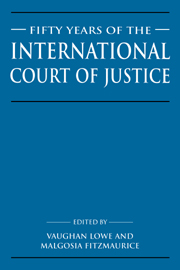Book contents
- Frontmatter
- Contents
- List of contributors
- Preface
- List of abbreviations
- Sir Robert Yewdall Jennings, by Vaughan Lowe
- List of publications of Sir Robert Jennings
- Table of cases
- Part I The International Court of Justice
- Part II The sources and evidences of international law
- Part III Substance of international law
- 10 The Court's role in relation to international organizations
- 11 Cases of the International Court of Justice relating to employment in international organizations
- 12 Jurisdiction and immunities
- 13 Adjudication as a mode of acquisition of territory?
- 14 Equitable maritime boundary delimitation
- 15 Environmental protection and the International Court of Justice
- 16 The contribution of the International Court of Justice to air law
- 17 The treatment of human rights and of aliens in the International Court of Justice
- 18 The International Court of Justice and the right of peoples to self-determination
- 19 The International Court of Justice and the peaceful settlement of disputes
- 20 The International Court of Justice and the use of force
- Part IV Procedural aspects of the work of the International Court of Justice
- Part V The International Court of Justice and the United Nations
- Index
13 - Adjudication as a mode of acquisition of territory?
Some observations on the Iraq—Kuwait boundary demarcation in light of the jurisprudence of the International Court of Justice
Published online by Cambridge University Press: 02 November 2009
- Frontmatter
- Contents
- List of contributors
- Preface
- List of abbreviations
- Sir Robert Yewdall Jennings, by Vaughan Lowe
- List of publications of Sir Robert Jennings
- Table of cases
- Part I The International Court of Justice
- Part II The sources and evidences of international law
- Part III Substance of international law
- 10 The Court's role in relation to international organizations
- 11 Cases of the International Court of Justice relating to employment in international organizations
- 12 Jurisdiction and immunities
- 13 Adjudication as a mode of acquisition of territory?
- 14 Equitable maritime boundary delimitation
- 15 Environmental protection and the International Court of Justice
- 16 The contribution of the International Court of Justice to air law
- 17 The treatment of human rights and of aliens in the International Court of Justice
- 18 The International Court of Justice and the right of peoples to self-determination
- 19 The International Court of Justice and the peaceful settlement of disputes
- 20 The International Court of Justice and the use of force
- Part IV Procedural aspects of the work of the International Court of Justice
- Part V The International Court of Justice and the United Nations
- Index
Summary
INTRODUCTION
In its resolution 687 of 8 April 1991 which presented to Iraq the bill for its invasion of Kuwait and for Operation Desert Storm, the Security Council among many other things demanded that Iraq (and Kuwait) respect the inviolability of their mutual international boundary. In the same resolution, the Security Council considered this boundary to have been recognized by both neighbouring states in ‘Minutes’ agreed upon in 1963. However, notwithstanding this agreement on the delimitation of the boundary, the Council also noted that the boundary was still in need of demarcation. In paragraph 3 of the resolution, the Secretary-General was called upon to assist Iraq and Kuwait in this matter and, in the same paragraph, received some instructions on how to proceed. On 2 May 1991, he reported to establish the Iraq-Kuwait Boundary Demarcation Commission.
The following pages analyse international jurisprudence, notably of the International Court of Justice and of the IKBDC, in support of the thesis that has long been advanced in international legal doctrine, that adjudication on territorial title is a sixth traditional mode of acquisition of territory in international law? ‘Traditional’, because, apart from cession, conquest, occupation, accretion and prescription, adjudication, too, was known in Roman law as a mode of acquiring dominion over property. However, it was the only one of these Roman law modes not adopted in international law.
- Type
- Chapter
- Information
- Fifty Years of the International Court of JusticeEssays in Honour of Sir Robert Jennings, pp. 237 - 263Publisher: Cambridge University PressPrint publication year: 1996
- 1
- Cited by



